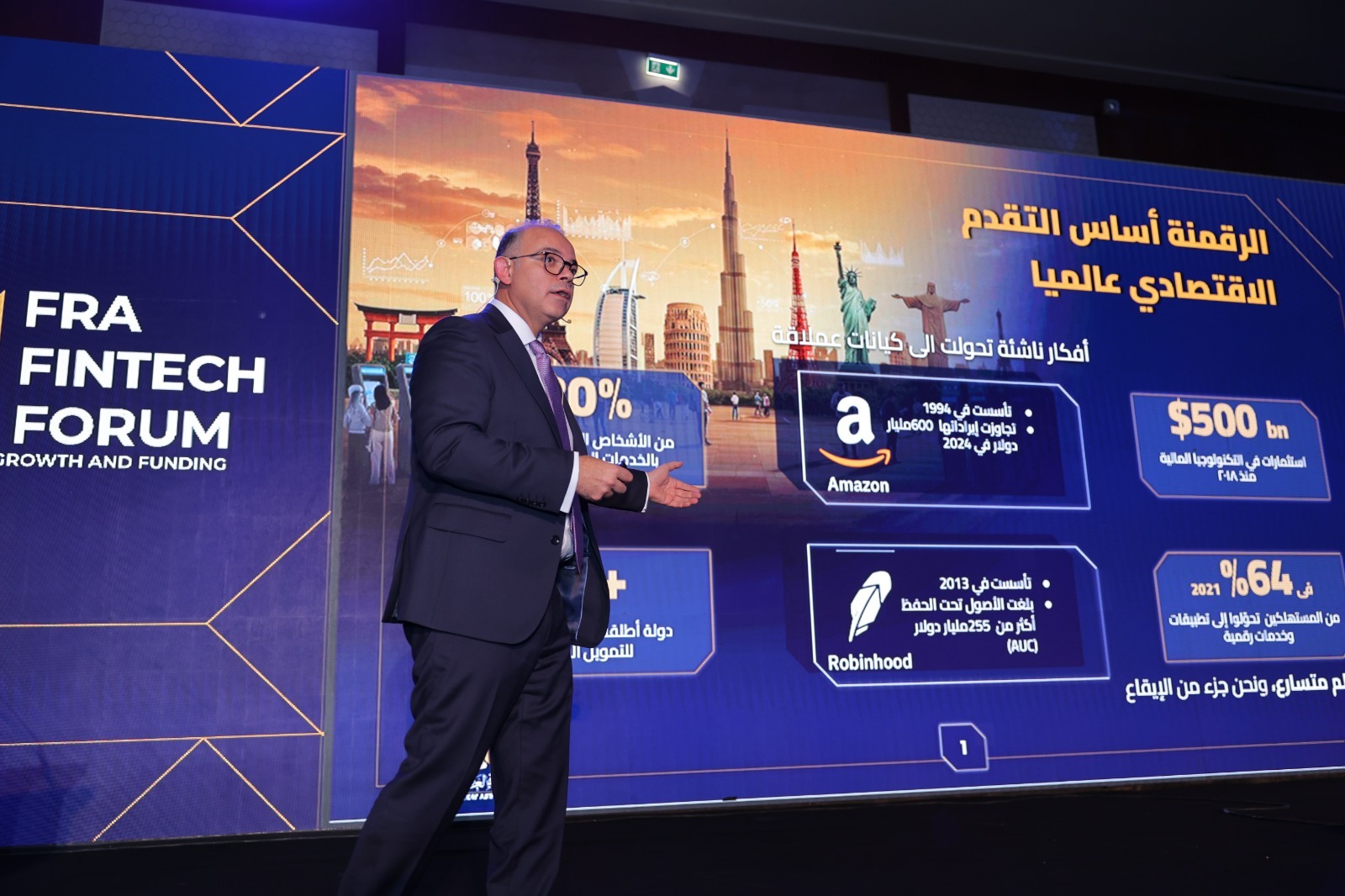Dr. Mohamed Farid – FRA Chairman:
- Regulators’ paramount task: Fostering market development while safeguarding stability.
- Digital transformation is no longer an option, but a strategic imperative to ensure the efficiency and sustainability of financial markets.
- Fintech boosts long-term savings and investments through accessibility, fostering a prosperous middle class.
- The Authority drives digital transformation in non-banking finance via a series of enabling laws and decisions.
Dr. Mohamed Farid, FRA Chairman, participated in an open discussion at FRA Fintech Forum 2025. The session convened digital transformation leaders, fintech startups, investors and innovation-supporting institutions from non-banking financial markets. Moderated by Seif El Khawanky, Country Director at the Center for International Private Enterprise and Mohamed Aboul Naga, Co-Founder & Executive Chairman of Exits MENA, the discussion underscored FRA’s commitment to engage with market players, understanding their digitalization challenges and opportunities and outlining supportive regulatory policies.
Attendees actively participated, praising FRA’s openness and noting that regulatory reforms have hastened digital transformation. Practical proposals were also submitted for legislative development, focusing on quicker licensing and wider digital service offerings.
During the discussion, Dr. Farid emphasized that balancing market opening and development with maintaining stability is the biggest challenge for any regulator. He highlighted the necessity of carefully studying various international experiences. He clarified that digital transformation is no longer an option but a strategic imperative to ensure the efficiency and sustainability of financial markets, pointing to the pivotal role the Authority plays in enabling technological innovation by developing a regulatory and supervisory environment that supports new business models and keeps pace with rapid changes in this dynamic sector.
Dr. Farid elaborated on how fintech aids in achieving long-term savings and investment goals, fostering a prosperous middle class. FRA analyzed the root causes of low penetration in non-banking financial services, emphasizing the importance of digitizing these operations for transaction efficiency. He also underscored the need for electronic platforms to have robust infrastructure to handle growth, alongside strong electronic protection systems to ensure data integrity and service continuity, even during user surges.
He added that the Authority has prioritized boosting digital transformation in non-banking financial activities. This is achieved through a series of laws and decisions that help companies offer services using modern technology, all while safeguarding client rights and market stability.
He also highlighted the Authority’s commitment to an integrated system with three key components: electronic identity verification, digital contracts and linking identity data to mobile numbers. This strategic move has triggered a significant surge, with recent data revealing over 200,000 new gold investment fund accounts opened in just one year and total investments in these unfamiliar funds now surpassing EGP 2 billion.
Dr. Farid detailed FRA’s legislative efforts to bolster fintech. He highlighted Law No. 5 of 2022, a landmark regulation that established a comprehensive licensing framework for fintech companies in non-banking financial activities. This was complemented by Resolution No. 58 of 2022 which set out specific conditions for establishing and licensing such entities.
Further regulatory steps included Resolution No. 139 of 2023, outlining requirements for technological infrastructure and security measures in fintech operations. This was followed by Resolution No. 140 of 2023, a pioneering regulation from a financial oversight body which defined requirements for digital identity, digital contracts, digital records and electronic customer identification. Finally, Resolution No. 141 of 2023 established an outsourcing register for companies providing electronic customer identification and contract record services to financial firms.
FRA Chairman emphasized FRA’s participatory approach to support fintech startups. This involves offering flexible licensing pathways, reducing early-stage regulatory costs and launching initiatives with international financial institutions to build capacity and provide innovative funding for company growth and expansion.
Dr. Farid underscored FRA’s progress in completing legislative frameworks to incentivize investment in crowdfunding. He noted the Authority is nearing a flexible model to adapt these regulations for modern financial instruments, a process informed by numerous stakeholder meetings.
In closing, Dr. Farid affirmed FRA’s ongoing commitment to develop legislation and digital infrastructure to support non-banking financial market evolution. He emphasized that open dialogue with industry pioneers remains fundamental to regulatory policymaking, balancing innovation with market safety and stability.
Last modified: July 27, 2025
